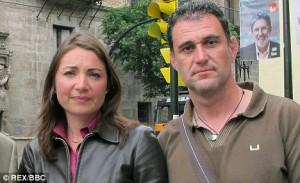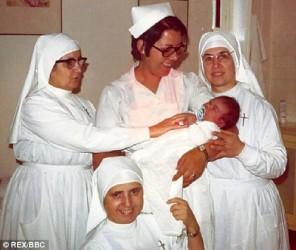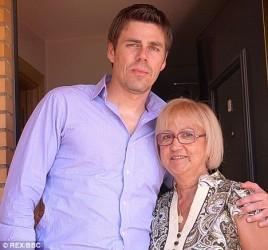By Linda C. Lavictoire
Lez Get Real
October 16, 2011
http://lezgetreal.com/2011/10/spanish-franco-regime-catholic-church-stole-and-sold-infants/
 |
| BBC journalist Katya Adler and Juan Luis Moreno |
 |
| Randy Ryder and his adoptive mother, 1971Randy Ryder and Manoli Pagador, 2011 |
 |
| Randy Ryder and Manoli Pagador, 2011 |
Between 1960 and 1989, as many as 300,000 newborn infants may have been trafficked by the Catholic Church, initially with the full knowledge and co-operation of the regime of dictator Francisco Franco. After Franco's death in 1975, the Spanish government's involvement is alleged to have been a case of government negligence and failure to regulate the adoption industry.
The baby trafficking appears to have been on two levels. The first was a politically motivated practice designed to punish Franco's opposition and critics. If a family were deemed dangerous to Franco's rule, which began in 1939, and had a pregnant family member, they would be told that the baby was stillborn or had died just after being born. In these cases, it was normally a couple's first-born child and may have been the grandchild of a Franco opponent. 1960 was still within that time when no family member attended births and women were sedated during delivery, so the deception was easy to pull off. The second level was actually routine with the Catholic Church worldwide. Unwed pregnant girls and women were turned over to the nuns until they delivered their babies. The mothers were relentlessly pressured to give up the babies for adoption, and it was not unheard of for a girl to be told her baby had died at birth if there was the slightest possibility that she was going to a "problem."
The hospitals and clinics in Spain were run by the Catholic Church, and arranged many of the adoptions before the baby was born. One woman, 89-year-old Ines Perez, has testified that a priest attached to the San Ramon clinic in Madrid told her to fake a pregnancy, wear padding which he supplied under her clothing, so that no one would question the arrival of her "baby" in 1969. Birth certificates were faked to show the adoptive parents as the birth parents.
In the period immediately following the death of Franco, several amnesty laws were passed concerning crimes committed by the regime, in the hopes that not prosecuting would help the nation heal faster. Additionally, the Church has traditionally been protected from government oversight and prosecution, so there is no national interest in pursuing these adoptions. The investigations have been undertaken by regional prosecutors, with 900 cases currently under review.
An informal effort has begun to set up a DNA database for the mothers whose babies were taken during this period, but there is no government attempt to create a central clearing house for these inquiries. Since so many of these adopted children were issued birth certificates with their adoptive parents listed as their biological parents, there is no reason for these adults to question their parentage. It was a deathbed confession that started the investigation.
When Juan Luis Moreno's father was dying, he confessed that he and his wife had bought Juan from a priest in the northern city of Zaragoza. At the same time, the parents of Antonio Barroso had bought him from the same priest for 200,000 pesetas, a huge sum at the time (No date was given for this transaction, but from 1959 to 1967, that would have been equivalent to $3,333, after 1967 $2,857) Antonio Barroso said that his adoptive parents paid installments for ten years for him.
There were also international adoptions. Texan Randy Ryder, 40, was one of those adoptions. His birthdate led Spaniard Manoli Pagador to believe Randy is her stolen son. An upcoming BBC television special tracks her search for the facts. Until it airs, the press has not been made privy to the results.
In come cases, particularly in the San Ramon clinic, when a mother was told her baby had died and demanded to see the baby, she was shown a corpse that many of these mothers have testified appeared to be freezing cold. Photos of a baby in a freezer, taken in the 1980′s were shown to the BBC reporter Katya Adler in their course of her investigations.
The adoptive parents were equally clueless about the circumstances. They were told the mothers had voluntarily given up their babies, instead of being pressured or deceived to do so.
In 1987, the Spanish government started taking responsibility for adoptions, and proper records began being kept.
Adler gave this overview of the scandal, "The situation is incredibly sad for thousands of people. There are men and women across Spain whose lives have been turned upside-down by discovering the people they thought were their parents actually bought them for cash. There are also many mothers who have maintained for years that their babies did not die – and were labelled 'hysterical' – but are now discovering that their child has probably been alive and brought up by somebody else all this time."
Experts believe that as much as 15% of the adoptions that took place in Spain between 1960 and 1989 were part of this conspiracy.
It is grossly unfair of those who are working to expose this to characterize the money that changed hands as the babies being "bought for cash." There is always money involved in an adoption, fees to be paid for legal work, "donations" made to hospitals or clinics to cover costs of the delivery, even layers of bribes to paid in foreign adoptions. The people who were adopting these babies probably didn't think of it as a case of buying a baby, but of the normal costs involved in an adoption.
The scandal is in the collusion between the Franco regime and the church in stealing babies from the families of political enemies and in the ways in which unwed mothers were lied to about their babies by members of the Catholic Church. Some aspects of the Church's relationships with unwed mothers have already been exposed in other countries. As the story unfolds in Spain, it will undoubtedly be repeated in other countries – stories of supposedly dead babies and off-the-book adoptions.
The Church can do two things at this point. Most probably, given their history, they will circle the wagons and obstruct investigations. Those involved will petition their governments and since most countries do not have the kinds of "amnesty for history" laws that Spain has, the Church will find itself under the same kind of scrutiny, criminal charges and civil suits that it has faced over pedophile priests. Or, the church can volunteer to set up DNA databases, open its records and help these mothers and children find each other. This goes beyond the simple desire to know the truth. There are strong medical reasons for adoption records to be opened. People deserve to know if they are carrying a genetic time bomb like a family history of breast cancer or paranoid schizophrenia.
The child abuse scandal has seriously damaged the Catholic Church, as much because of the attempts at denial than because of the abuses themselves. An international adoption scandal would just worsen the Church's position in the world. Or, if saner heads can prevail at the Vatican, they can use this situation to start to rebuild the trust their members have lost in them.
Any original material on these pages is copyright © BishopAccountability.org 2004. Reproduce freely with attribution.